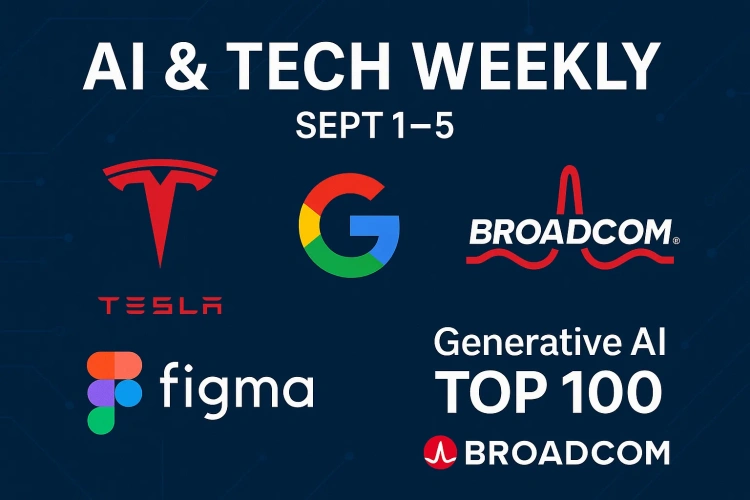AI Navigation
- articleAI Trends
- lightbulb_2AI Tips
- assistant_navigationAI Navigation
- heatHot Articles
- emergency_heat_2Hot Tips
- format_list_numberedPrompt Formatter
- psychologyTest Center(RPI)
AI & Tech Weekly (Sept 1–5): Tesla’s AI Pivot, Google’s Antitrust Escape, Figma’s Market Jitters, Generative AI Top 100, Broadcom’s ASIC Surge
This past week, the AI and tech landscape once again delivered plenty of drama. From Tesla’s official shift into AI and robotics, to Google’s narrow escape in its U.S. antitrust case, to Figma’s stock plunge despite rapid growth, the competition in AI is intensifying. Below is iaiseek’s editorial selection of five key developments and our take on them.

1. Tesla releases Master Plan Part IV, making AI and robotics its new core
Tesla published Master Plan Part IV on X, signaling a sweeping shift in company strategy from EVs and energy to artificial intelligence and robotics. The plan outlined five guiding principles, including “Growth is unlimited” and “Innovation removes limits,” and marked the beginning of a new growth cycle.
The focus is on autonomous driving (Robotaxi, Robovan) and humanoid robots (Optimus), aiming to integrate robots into the physical world through AI and accelerate global prosperity.
Commentary:
By putting AI and robotics at the heart of its roadmap, Tesla makes it clear it is no longer just a car company but is transforming into an AI-driven tech powerhouse. Autonomous driving remains the plan’s main pillar, with the potential to reshape urban transport and economies. Yet FSD is still in Beta, with regulatory hurdles and edge cases standing in the way.
The vision of robots taking over repetitive tasks and freeing human creativity is compelling. But real-world implementation will require major progress in algorithm stability, legal frameworks, and public acceptance.
2. Google dodges core business breakup in U.S. antitrust trial, thanks to generative AI
The court banned Google from signing new exclusive search agreements, limiting its ability to block rivals. However, the company retained its lucrative partnership with Apple, which secures Google’s dominant default search position on iPhones—critical to its traffic and ad revenue.
The rise of generative AI tools (ChatGPT, Grok, Perplexity) was cited as a key factor in intensifying search competition, weakening the case for breaking Google apart.
Commentary:
That Google managed to avoid a forced breakup owes much to the generative AI boom, which convinced the court that competition in search has become fiercer. But this is no permanent reprieve. As users increasingly turn to AI assistants instead of traditional search, Google must grapple with an entirely new kind of threat.
3. Figma: rapid growth can’t stop stock plunge
Figma reported Q2 revenue of $249.6 million, up 41% year-on-year, but slightly below Wall Street’s expectation of $250 million. Its stock fell more than 14% in after-hours trading. Under GAAP, the company posted a net profit of $846,000 and now counts 1,119 customers generating over $100,000 in annual revenue.
Commentary:
For a high-valuation company like Figma, “beating expectations” is the norm—simply maintaining growth won’t cut it. This quarter’s guidance, only marginally above forecasts, disappointed investors. GAAP profits remain razor-thin, underlining challenges in monetization and cost control. The key question is whether Figma can achieve profitable scale while maintaining its momentum.
4. Generative AI Top 100 list released
Andreessen Horowitz published its “Global Top 100 Consumer Generative AI Applications.” ChatGPT and Gemini ranked first on web and mobile respectively, while China’s DeepSeek took the #3 spot on the web. Notably, no Korean products made the list. The ranking, based on global traffic data, highlights the competitive dynamics in consumer AI over the past two and a half years: the U.S. still dominates, but China is showing strong momentum in mobile applications.
Commentary:
The U.S. continues to lead in foundation models and general-purpose AI apps, but DeepSeek’s rise shows China is catching up fast and carving out an edge in mobile innovation. This marks a shift from “model followers” to “application leaders.” Korea’s absence highlights regional innovation gaps. The next phase of AI competition will be a battle not just of technology, but also ecosystems, applications, and geopolitics.
5. Broadcom Q3 earnings: AI ASIC business surges
Broadcom reported fiscal Q3 2025 revenue of nearly $16 billion, up 22%, with adjusted EPS of $1.69—both beating expectations. AI infrastructure-related semiconductor revenue hit $5.2 billion, up 63% year-on-year and far above forecasts. Broadcom has become a major force in AI ASIC chips, with deep partnerships with Google, Apple, Meta, and more hyperscale data center operators.
Commentary:
Broadcom’s strength in custom AI ASIC design is helping customers reduce reliance on general-purpose GPUs like Nvidia’s. Unlike Marvell, which saw its stock tumble after earnings, Broadcom is being rewarded by investors. With AI-related revenue surging, it has established itself as a key growth engine. Whether Broadcom can become “the next Nvidia” is a question worth watching closely.
Closing Thoughts
From Tesla’s bold AI pivot to Google’s regulatory reprieve, from Figma’s uneasy growth story to Broadcom’s ASIC momentum, this week’s developments underscore a common theme: AI is no longer a side play but the central battlefield shaping tech’s future.
The competition ahead will not only be about models, but also about ecosystems, regulation, and execution.
For more AI insights, business analysis, and tech trends, visit:
👉 iaiseek.com